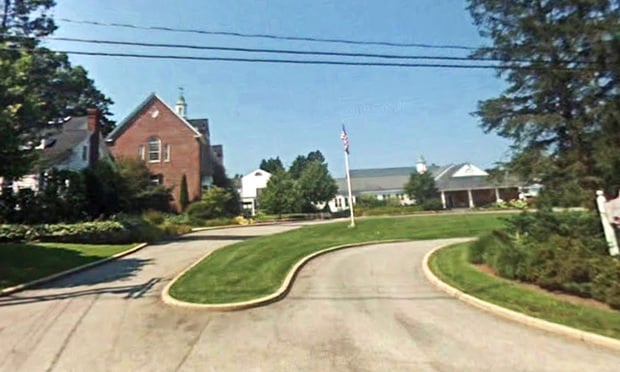Time Ran Out: Judge Dismisses Case Alleging Sex Assault Decades Earlier
Citing the statute of limitation for when a victim of sex assault can file a lawsuit, a federal judge Monday granted a motion for summary judgment on behalf of the prestigious Indian Mountain School.
March 18, 2020 at 01:34 PM
5 minute read
 Indian Mountain School, Lakeville. Photo: Google
Indian Mountain School, Lakeville. Photo: Google
With a slew of Connecticut boarding schools being sued for sexual abuse dating back decades, the statute of limitations is taking center stage.
The lawsuits hint at varying litigation strategies for plaintiffs working against statutory deadlines.
One of those schools got word Monday that a lawsuit alleging a former Indian Mountain School English teacher sexually abused a boy decades ago was dismissed.
While U.S. District Judge Janet Bond Arterton of the District of Connecticut's ruling—in all likelihood—closed the books on a lawsuit filed on behalf of former Indian Mountain School student Ramsay Gourd, an attorney in an unrelated case is using a different strategy as he also went up against statute of limitations rules in a decades-old sex abuse case.
In February, plaintiffs counsel Ryan McGuigan, principal of Hartford-based Rome McGuigan, was faced with presenting oral arguments to the Connecticut Supreme Court in a matter that involved several consolidated lawsuits filed on behalf of patients of a pediatrician accused of sex abuse. The doctor has since died. In that case, the victims are all now in their 40s and have several more years in which they could bring suit. But, McGuigan, citing "strategy," said he'd make the case to the justices in focusing on negligence claims—not the sex abuse claims— which has a three-year window under state law.
McGuigan maintained the negligence and sexual abuse claims were intertwined, and, therefore, the three-year statute of limitations for negligence claims shouldn't apply. It's not clear if McGuigan's strategy will prevail as the justices on the state's high court have yet to rule on the case.
While the Gourd case did include claims of negligence and infliction of emotional distress, the strategy McGuigan focused on was to made the negligence claims first and foremost and forego the sex abuse arguments.
In her 19-page ruling in the Gourd case, Arterton said the action wasn't timely since the statute of limitation had run out.
The ruling from the federal judge could have an impact on attorneys down the road who decide to pursue similar cases where the statute of limitations plays a factor.
Gourd, a former student of the pre-K through grade 9 private boarding school, joined many other students over the years who claimed now deceased teacher Christopher Simonds sexually assaulted them. Gourd claims he was sexually assaulted when he was a student from 1977-1980.
Gourd filed his lawsuit against the school in 2018. At the time, Gourd was 53 years old even though he was required to file suit up to his 48th birthday. Today, victims can file suit up to their 51st birthday. In Gourd's suit, plaintiffs counsel argued the statute of limitations should be removed under the doctrine of fraudulent concealment. Fraudulent concealment occurs when a party conceals or intentionally suppresses material information.
Gourd's counsel, Koskoff Koskoff & Bieder attorney Antonio Ponvert III, maintains in court papers his client didn't know until after the statute of limitations expired that the school allegedly knew that Simonds was a pedophile, had abused other children and did nothing about it.
Ponvert declined to comment for this story.
But, Ponvert's arguments did not sway Arterton, who wrote, "There is no genuine issue of material fact that plaintiff timely knew that he had a potential cause of action against defendant. Because it is undisputed that plaintiff was aware that he had a potential cause of action against defendant, plaintiff cannot, as a matter of law, rely on the fraudulent concealment doctrine to toll the timing of his claims."
The judge also wrote that there was sufficient information in the public realm including via media reports and other lawsuits that the school should have known that the teacher had the propensity to abuse young students before 2013, the timeframe of when Gourd was supposed to have filed suit.
Simonds has been accused of sexually assaulting several boys in the private boarding school in Lakeville. The school reached confidential settlements with two alleged victims in January 2018.
The Gourd lawsuit alleges that he and other students were known as Simonds' "boys" or "pets" and that Simonds gave them marijuana, cigarettes, alcohol, LSD and cocaine. Simonds also allegedly showed Gourd and other boys pornography and took photos of them to blackmail them into silence. The lawsuit sought, among other things, compensatory and punitive damages against the school.
The judge's ruling this week comes on the heels of numerous similar lawsuits against private boarding schools in the state. They include a suit against The Westover School alleging a teacher sexually abused a student there in 2006 and 2007; The Hotchkiss School, where several boys alleged a teacher abused them in the 1990s; and the Kent School, where a female student alleged a French teacher repeatedly sexually assaulted her in the 1980s.
Representing Indian Mountain are Robinson & Cole Hartford attorneys Bradford Babbitt, Kathleen Dion and Jeffrey White. None of the attorneys responded to a request for comment Tuesday.
Ally Morrissey is the school's director of communications. Due to concerns over the coronavirus, the school is closed. Morrissey could not be reached for comment.
Related stories:
Federal Judge Dismisses Part of Sex Assault Suit Against Indian Mountain School
Indian Mountain School Hit With Another Sexual Abuse Lawsuit
This content has been archived. It is available through our partners, LexisNexis® and Bloomberg Law.
To view this content, please continue to their sites.
Not a Lexis Subscriber?
Subscribe Now
Not a Bloomberg Law Subscriber?
Subscribe Now
NOT FOR REPRINT
© 2025 ALM Global, LLC, All Rights Reserved. Request academic re-use from www.copyright.com. All other uses, submit a request to [email protected]. For more information visit Asset & Logo Licensing.
You Might Like
View All


Trump Administration Faces Legal Challenge Over EO Impacting Federal Workers
3 minute read
Settlement Allows Spouses of U.S. Citizens to Reopen Removal Proceedings
4 minute readLaw Firms Mentioned
Trending Stories
- 1Thursday Newspaper
- 2Public Notices/Calendars
- 3Judicial Ethics Opinion 24-117
- 4Rejuvenation of a Sharp Employer Non-Compete Tool: Delaware Supreme Court Reinvigorates the Employee Choice Doctrine
- 5Mastering Litigation in New York’s Commercial Division Part V, Leave It to the Experts: Expert Discovery in the New York Commercial Division
Who Got The Work
J. Brugh Lower of Gibbons has entered an appearance for industrial equipment supplier Devco Corporation in a pending trademark infringement lawsuit. The suit, accusing the defendant of selling knock-off Graco products, was filed Dec. 18 in New Jersey District Court by Rivkin Radler on behalf of Graco Inc. and Graco Minnesota. The case, assigned to U.S. District Judge Zahid N. Quraishi, is 3:24-cv-11294, Graco Inc. et al v. Devco Corporation.
Who Got The Work
Rebecca Maller-Stein and Kent A. Yalowitz of Arnold & Porter Kaye Scholer have entered their appearances for Hanaco Venture Capital and its executives, Lior Prosor and David Frankel, in a pending securities lawsuit. The action, filed on Dec. 24 in New York Southern District Court by Zell, Aron & Co. on behalf of Goldeneye Advisors, accuses the defendants of negligently and fraudulently managing the plaintiff's $1 million investment. The case, assigned to U.S. District Judge Vernon S. Broderick, is 1:24-cv-09918, Goldeneye Advisors, LLC v. Hanaco Venture Capital, Ltd. et al.
Who Got The Work
Attorneys from A&O Shearman has stepped in as defense counsel for Toronto-Dominion Bank and other defendants in a pending securities class action. The suit, filed Dec. 11 in New York Southern District Court by Bleichmar Fonti & Auld, accuses the defendants of concealing the bank's 'pervasive' deficiencies in regards to its compliance with the Bank Secrecy Act and the quality of its anti-money laundering controls. The case, assigned to U.S. District Judge Arun Subramanian, is 1:24-cv-09445, Gonzalez v. The Toronto-Dominion Bank et al.
Who Got The Work
Crown Castle International, a Pennsylvania company providing shared communications infrastructure, has turned to Luke D. Wolf of Gordon Rees Scully Mansukhani to fend off a pending breach-of-contract lawsuit. The court action, filed Nov. 25 in Michigan Eastern District Court by Hooper Hathaway PC on behalf of The Town Residences LLC, accuses Crown Castle of failing to transfer approximately $30,000 in utility payments from T-Mobile in breach of a roof-top lease and assignment agreement. The case, assigned to U.S. District Judge Susan K. Declercq, is 2:24-cv-13131, The Town Residences LLC v. T-Mobile US, Inc. et al.
Who Got The Work
Wilfred P. Coronato and Daniel M. Schwartz of McCarter & English have stepped in as defense counsel to Electrolux Home Products Inc. in a pending product liability lawsuit. The court action, filed Nov. 26 in New York Eastern District Court by Poulos Lopiccolo PC and Nagel Rice LLP on behalf of David Stern, alleges that the defendant's refrigerators’ drawers and shelving repeatedly break and fall apart within months after purchase. The case, assigned to U.S. District Judge Joan M. Azrack, is 2:24-cv-08204, Stern v. Electrolux Home Products, Inc.
Featured Firms
Law Offices of Gary Martin Hays & Associates, P.C.
(470) 294-1674
Law Offices of Mark E. Salomone
(857) 444-6468
Smith & Hassler
(713) 739-1250










